Cross-Cultural Management and Leadership Report: Analysis and Advice
VerifiedAdded on 2023/04/07
|14
|3206
|400
Report
AI Summary
This report analyzes the Harvard Business Review case study "From Regional Star to Global Leader," focusing on the cross-cultural management challenges faced by Yang Jianguo, the senior vice president of global product development at Deronde International. The report identifies the conflicts and misunderstandings arising from Jianguo's inability to embrace French culture and western management styles, contrasting them with his Chinese background. It offers advice for Jianguo, emphasizing the importance of understanding French culture, adopting western management practices, and implementing glocalization strategies. Furthermore, the report highlights essential management competencies for 21st-century leaders operating in a VUCA (volatile, uncertain, complex, ambiguous) world, such as cross-cultural management, effective leadership styles, and glocalization. The report concludes by summarizing key takeaways and recommendations for successful global leadership in a diverse and interconnected business environment, providing valuable insights for strategic management.
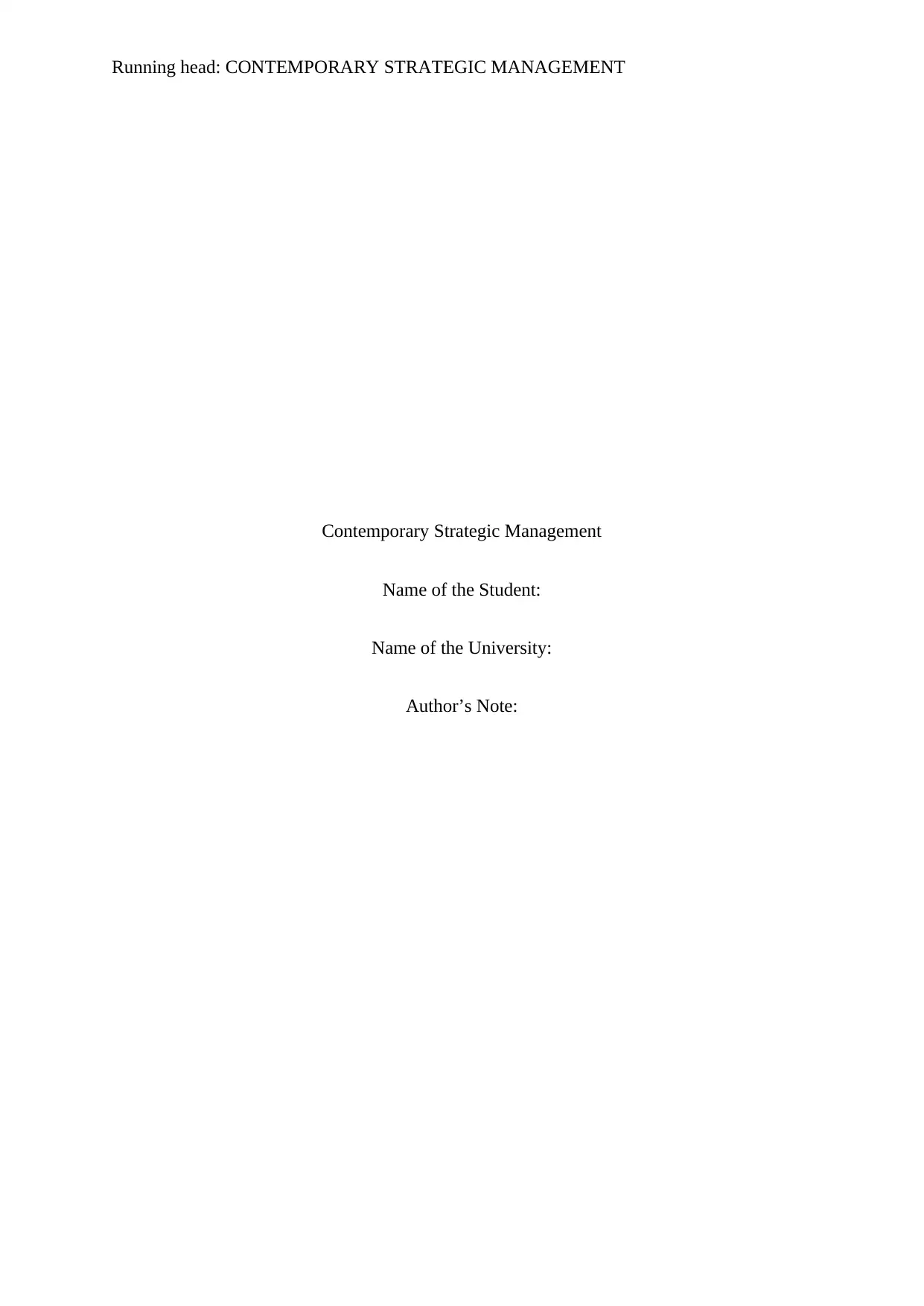
Running head: CONTEMPORARY STRATEGIC MANAGEMENT
Contemporary Strategic Management
Name of the Student:
Name of the University:
Author’s Note:
Contemporary Strategic Management
Name of the Student:
Name of the University:
Author’s Note:
Paraphrase This Document
Need a fresh take? Get an instant paraphrase of this document with our AI Paraphraser
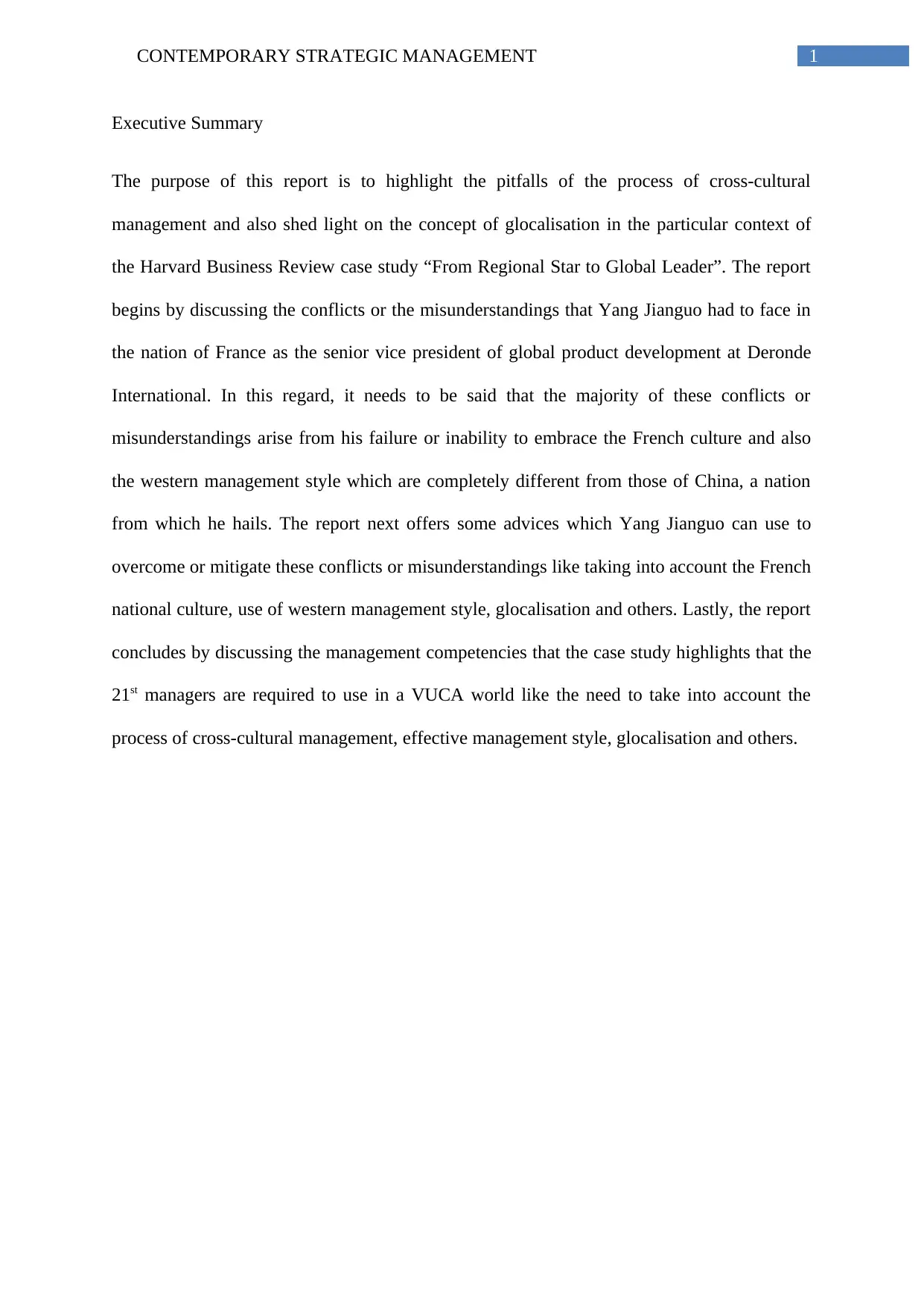
1CONTEMPORARY STRATEGIC MANAGEMENT
Executive Summary
The purpose of this report is to highlight the pitfalls of the process of cross-cultural
management and also shed light on the concept of glocalisation in the particular context of
the Harvard Business Review case study “From Regional Star to Global Leader”. The report
begins by discussing the conflicts or the misunderstandings that Yang Jianguo had to face in
the nation of France as the senior vice president of global product development at Deronde
International. In this regard, it needs to be said that the majority of these conflicts or
misunderstandings arise from his failure or inability to embrace the French culture and also
the western management style which are completely different from those of China, a nation
from which he hails. The report next offers some advices which Yang Jianguo can use to
overcome or mitigate these conflicts or misunderstandings like taking into account the French
national culture, use of western management style, glocalisation and others. Lastly, the report
concludes by discussing the management competencies that the case study highlights that the
21st managers are required to use in a VUCA world like the need to take into account the
process of cross-cultural management, effective management style, glocalisation and others.
Executive Summary
The purpose of this report is to highlight the pitfalls of the process of cross-cultural
management and also shed light on the concept of glocalisation in the particular context of
the Harvard Business Review case study “From Regional Star to Global Leader”. The report
begins by discussing the conflicts or the misunderstandings that Yang Jianguo had to face in
the nation of France as the senior vice president of global product development at Deronde
International. In this regard, it needs to be said that the majority of these conflicts or
misunderstandings arise from his failure or inability to embrace the French culture and also
the western management style which are completely different from those of China, a nation
from which he hails. The report next offers some advices which Yang Jianguo can use to
overcome or mitigate these conflicts or misunderstandings like taking into account the French
national culture, use of western management style, glocalisation and others. Lastly, the report
concludes by discussing the management competencies that the case study highlights that the
21st managers are required to use in a VUCA world like the need to take into account the
process of cross-cultural management, effective management style, glocalisation and others.
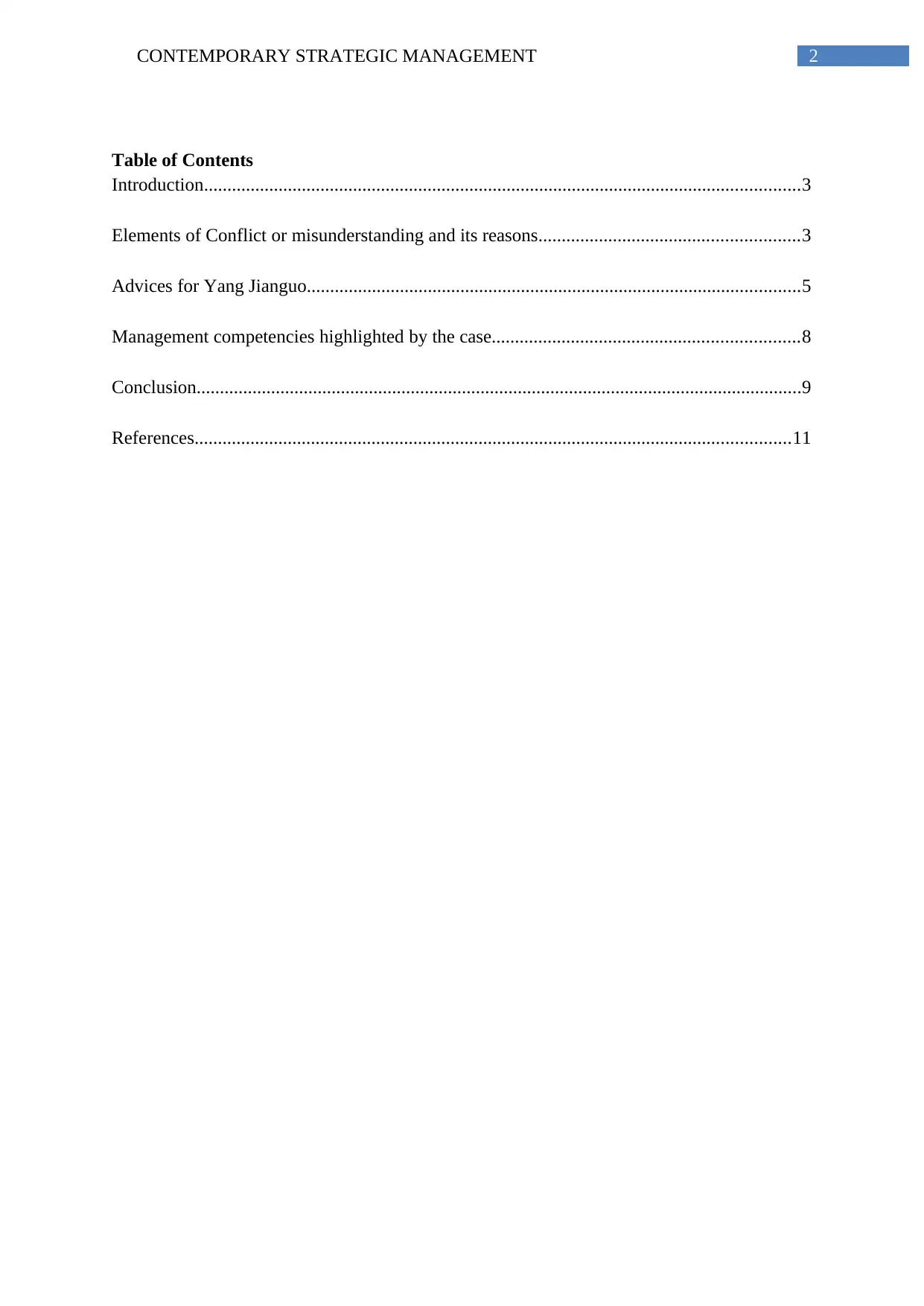
2CONTEMPORARY STRATEGIC MANAGEMENT
Table of Contents
Introduction................................................................................................................................3
Elements of Conflict or misunderstanding and its reasons........................................................3
Advices for Yang Jianguo..........................................................................................................5
Management competencies highlighted by the case..................................................................8
Conclusion..................................................................................................................................9
References................................................................................................................................11
Table of Contents
Introduction................................................................................................................................3
Elements of Conflict or misunderstanding and its reasons........................................................3
Advices for Yang Jianguo..........................................................................................................5
Management competencies highlighted by the case..................................................................8
Conclusion..................................................................................................................................9
References................................................................................................................................11
⊘ This is a preview!⊘
Do you want full access?
Subscribe today to unlock all pages.

Trusted by 1+ million students worldwide
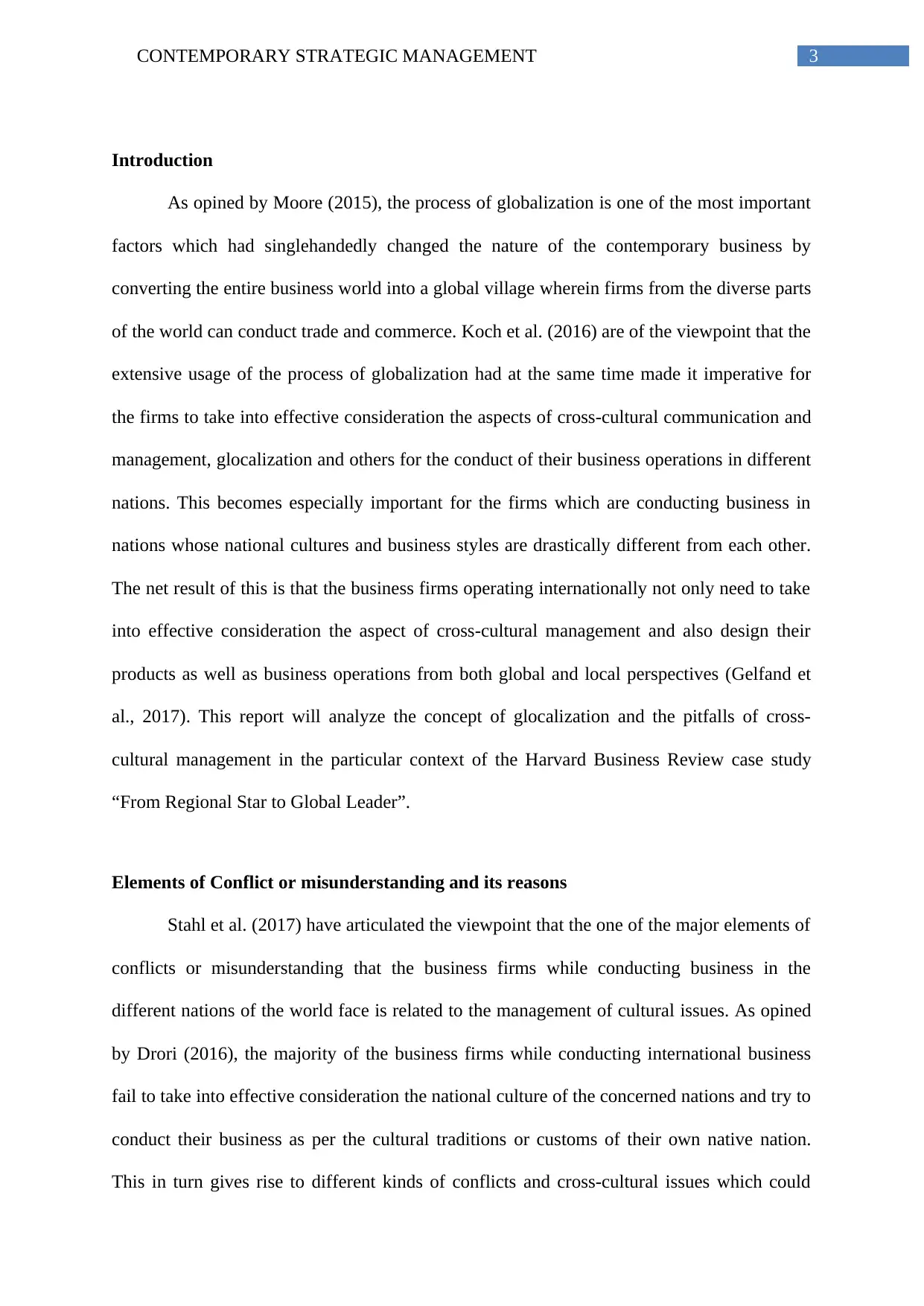
3CONTEMPORARY STRATEGIC MANAGEMENT
Introduction
As opined by Moore (2015), the process of globalization is one of the most important
factors which had singlehandedly changed the nature of the contemporary business by
converting the entire business world into a global village wherein firms from the diverse parts
of the world can conduct trade and commerce. Koch et al. (2016) are of the viewpoint that the
extensive usage of the process of globalization had at the same time made it imperative for
the firms to take into effective consideration the aspects of cross-cultural communication and
management, glocalization and others for the conduct of their business operations in different
nations. This becomes especially important for the firms which are conducting business in
nations whose national cultures and business styles are drastically different from each other.
The net result of this is that the business firms operating internationally not only need to take
into effective consideration the aspect of cross-cultural management and also design their
products as well as business operations from both global and local perspectives (Gelfand et
al., 2017). This report will analyze the concept of glocalization and the pitfalls of cross-
cultural management in the particular context of the Harvard Business Review case study
“From Regional Star to Global Leader”.
Elements of Conflict or misunderstanding and its reasons
Stahl et al. (2017) have articulated the viewpoint that the one of the major elements of
conflicts or misunderstanding that the business firms while conducting business in the
different nations of the world face is related to the management of cultural issues. As opined
by Drori (2016), the majority of the business firms while conducting international business
fail to take into effective consideration the national culture of the concerned nations and try to
conduct their business as per the cultural traditions or customs of their own native nation.
This in turn gives rise to different kinds of conflicts and cross-cultural issues which could
Introduction
As opined by Moore (2015), the process of globalization is one of the most important
factors which had singlehandedly changed the nature of the contemporary business by
converting the entire business world into a global village wherein firms from the diverse parts
of the world can conduct trade and commerce. Koch et al. (2016) are of the viewpoint that the
extensive usage of the process of globalization had at the same time made it imperative for
the firms to take into effective consideration the aspects of cross-cultural communication and
management, glocalization and others for the conduct of their business operations in different
nations. This becomes especially important for the firms which are conducting business in
nations whose national cultures and business styles are drastically different from each other.
The net result of this is that the business firms operating internationally not only need to take
into effective consideration the aspect of cross-cultural management and also design their
products as well as business operations from both global and local perspectives (Gelfand et
al., 2017). This report will analyze the concept of glocalization and the pitfalls of cross-
cultural management in the particular context of the Harvard Business Review case study
“From Regional Star to Global Leader”.
Elements of Conflict or misunderstanding and its reasons
Stahl et al. (2017) have articulated the viewpoint that the one of the major elements of
conflicts or misunderstanding that the business firms while conducting business in the
different nations of the world face is related to the management of cultural issues. As opined
by Drori (2016), the majority of the business firms while conducting international business
fail to take into effective consideration the national culture of the concerned nations and try to
conduct their business as per the cultural traditions or customs of their own native nation.
This in turn gives rise to different kinds of conflicts and cross-cultural issues which could
Paraphrase This Document
Need a fresh take? Get an instant paraphrase of this document with our AI Paraphraser
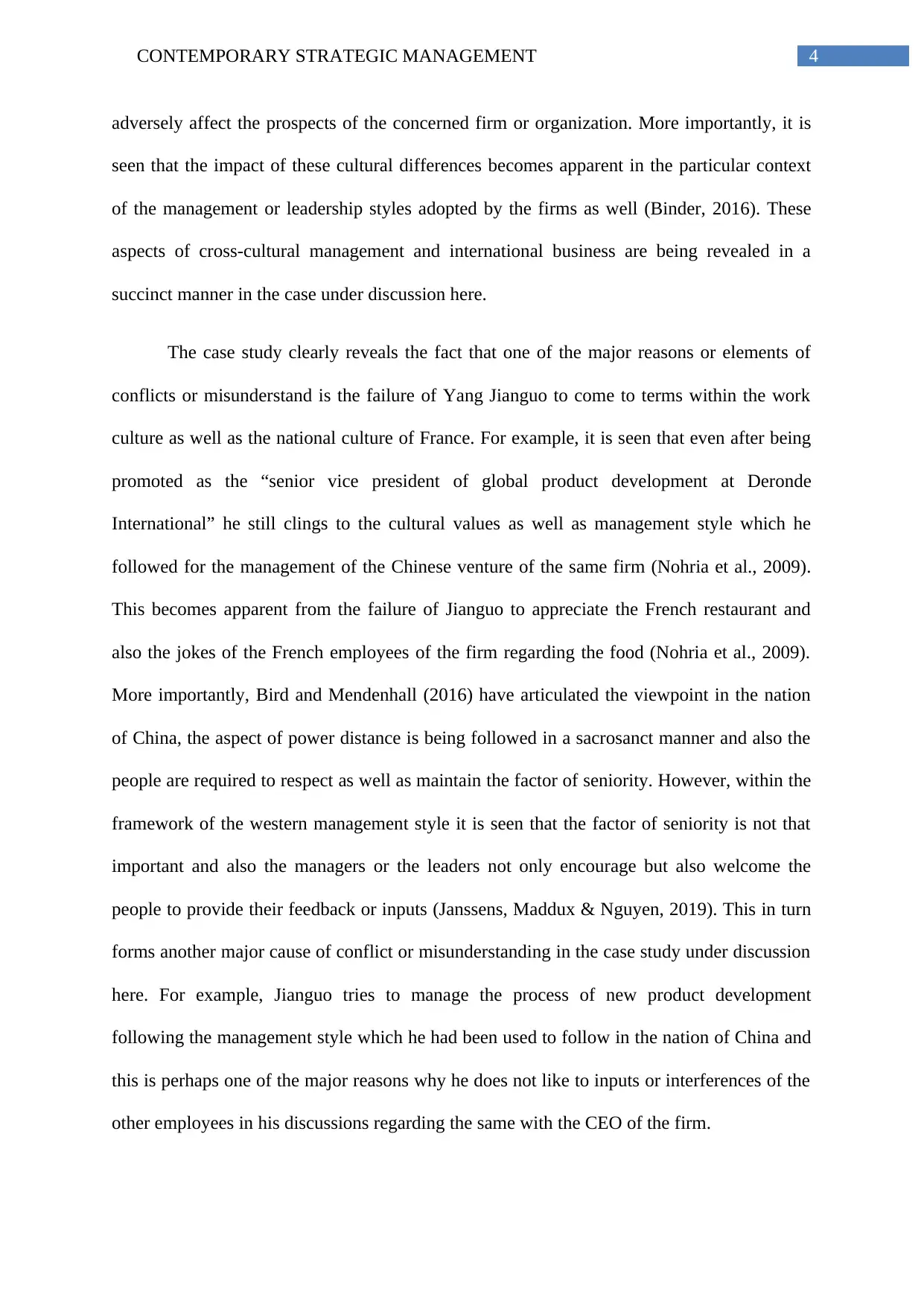
4CONTEMPORARY STRATEGIC MANAGEMENT
adversely affect the prospects of the concerned firm or organization. More importantly, it is
seen that the impact of these cultural differences becomes apparent in the particular context
of the management or leadership styles adopted by the firms as well (Binder, 2016). These
aspects of cross-cultural management and international business are being revealed in a
succinct manner in the case under discussion here.
The case study clearly reveals the fact that one of the major reasons or elements of
conflicts or misunderstand is the failure of Yang Jianguo to come to terms within the work
culture as well as the national culture of France. For example, it is seen that even after being
promoted as the “senior vice president of global product development at Deronde
International” he still clings to the cultural values as well as management style which he
followed for the management of the Chinese venture of the same firm (Nohria et al., 2009).
This becomes apparent from the failure of Jianguo to appreciate the French restaurant and
also the jokes of the French employees of the firm regarding the food (Nohria et al., 2009).
More importantly, Bird and Mendenhall (2016) have articulated the viewpoint in the nation
of China, the aspect of power distance is being followed in a sacrosanct manner and also the
people are required to respect as well as maintain the factor of seniority. However, within the
framework of the western management style it is seen that the factor of seniority is not that
important and also the managers or the leaders not only encourage but also welcome the
people to provide their feedback or inputs (Janssens, Maddux & Nguyen, 2019). This in turn
forms another major cause of conflict or misunderstanding in the case study under discussion
here. For example, Jianguo tries to manage the process of new product development
following the management style which he had been used to follow in the nation of China and
this is perhaps one of the major reasons why he does not like to inputs or interferences of the
other employees in his discussions regarding the same with the CEO of the firm.
adversely affect the prospects of the concerned firm or organization. More importantly, it is
seen that the impact of these cultural differences becomes apparent in the particular context
of the management or leadership styles adopted by the firms as well (Binder, 2016). These
aspects of cross-cultural management and international business are being revealed in a
succinct manner in the case under discussion here.
The case study clearly reveals the fact that one of the major reasons or elements of
conflicts or misunderstand is the failure of Yang Jianguo to come to terms within the work
culture as well as the national culture of France. For example, it is seen that even after being
promoted as the “senior vice president of global product development at Deronde
International” he still clings to the cultural values as well as management style which he
followed for the management of the Chinese venture of the same firm (Nohria et al., 2009).
This becomes apparent from the failure of Jianguo to appreciate the French restaurant and
also the jokes of the French employees of the firm regarding the food (Nohria et al., 2009).
More importantly, Bird and Mendenhall (2016) have articulated the viewpoint in the nation
of China, the aspect of power distance is being followed in a sacrosanct manner and also the
people are required to respect as well as maintain the factor of seniority. However, within the
framework of the western management style it is seen that the factor of seniority is not that
important and also the managers or the leaders not only encourage but also welcome the
people to provide their feedback or inputs (Janssens, Maddux & Nguyen, 2019). This in turn
forms another major cause of conflict or misunderstanding in the case study under discussion
here. For example, Jianguo tries to manage the process of new product development
following the management style which he had been used to follow in the nation of China and
this is perhaps one of the major reasons why he does not like to inputs or interferences of the
other employees in his discussions regarding the same with the CEO of the firm.
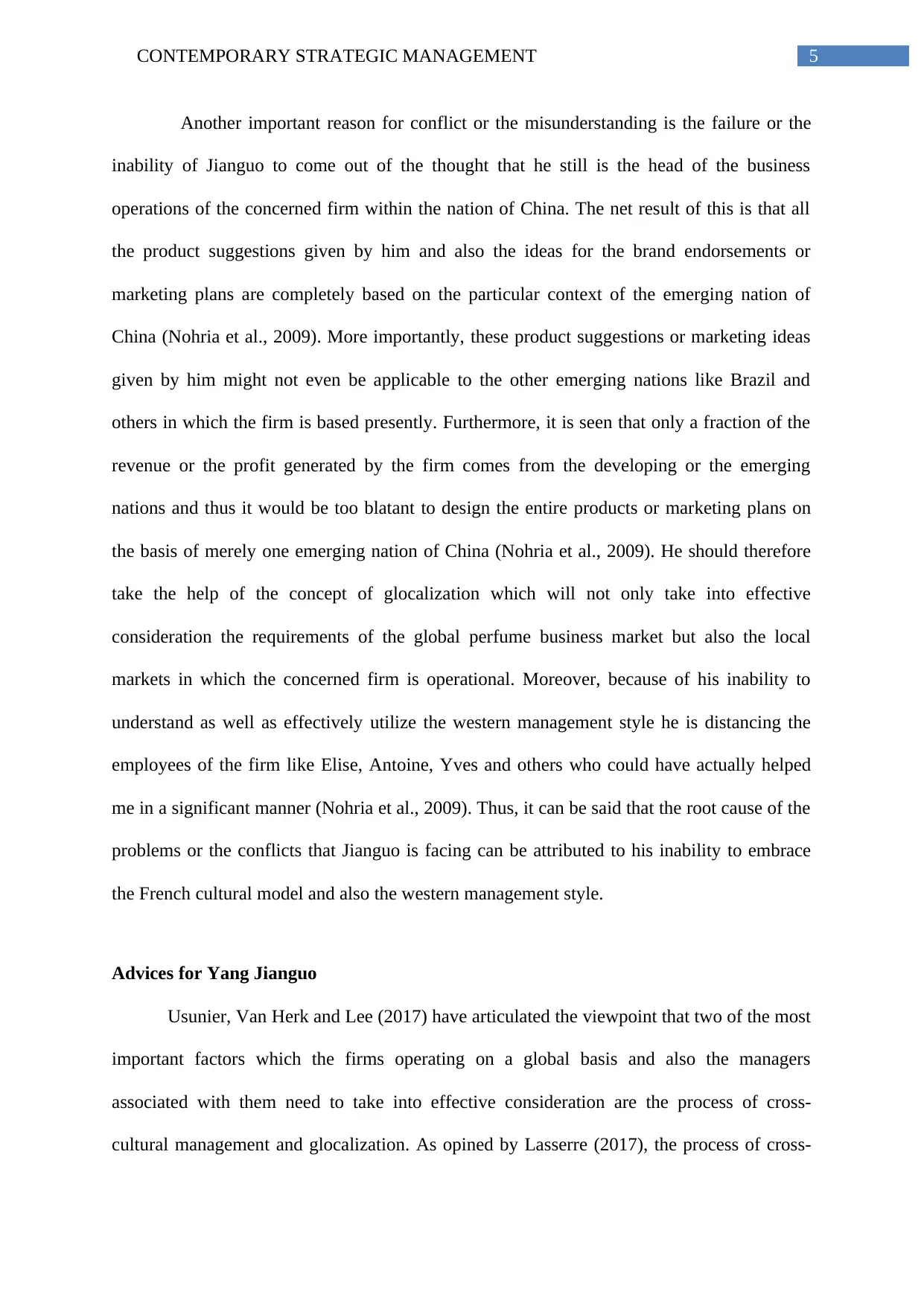
5CONTEMPORARY STRATEGIC MANAGEMENT
Another important reason for conflict or the misunderstanding is the failure or the
inability of Jianguo to come out of the thought that he still is the head of the business
operations of the concerned firm within the nation of China. The net result of this is that all
the product suggestions given by him and also the ideas for the brand endorsements or
marketing plans are completely based on the particular context of the emerging nation of
China (Nohria et al., 2009). More importantly, these product suggestions or marketing ideas
given by him might not even be applicable to the other emerging nations like Brazil and
others in which the firm is based presently. Furthermore, it is seen that only a fraction of the
revenue or the profit generated by the firm comes from the developing or the emerging
nations and thus it would be too blatant to design the entire products or marketing plans on
the basis of merely one emerging nation of China (Nohria et al., 2009). He should therefore
take the help of the concept of glocalization which will not only take into effective
consideration the requirements of the global perfume business market but also the local
markets in which the concerned firm is operational. Moreover, because of his inability to
understand as well as effectively utilize the western management style he is distancing the
employees of the firm like Elise, Antoine, Yves and others who could have actually helped
me in a significant manner (Nohria et al., 2009). Thus, it can be said that the root cause of the
problems or the conflicts that Jianguo is facing can be attributed to his inability to embrace
the French cultural model and also the western management style.
Advices for Yang Jianguo
Usunier, Van Herk and Lee (2017) have articulated the viewpoint that two of the most
important factors which the firms operating on a global basis and also the managers
associated with them need to take into effective consideration are the process of cross-
cultural management and glocalization. As opined by Lasserre (2017), the process of cross-
Another important reason for conflict or the misunderstanding is the failure or the
inability of Jianguo to come out of the thought that he still is the head of the business
operations of the concerned firm within the nation of China. The net result of this is that all
the product suggestions given by him and also the ideas for the brand endorsements or
marketing plans are completely based on the particular context of the emerging nation of
China (Nohria et al., 2009). More importantly, these product suggestions or marketing ideas
given by him might not even be applicable to the other emerging nations like Brazil and
others in which the firm is based presently. Furthermore, it is seen that only a fraction of the
revenue or the profit generated by the firm comes from the developing or the emerging
nations and thus it would be too blatant to design the entire products or marketing plans on
the basis of merely one emerging nation of China (Nohria et al., 2009). He should therefore
take the help of the concept of glocalization which will not only take into effective
consideration the requirements of the global perfume business market but also the local
markets in which the concerned firm is operational. Moreover, because of his inability to
understand as well as effectively utilize the western management style he is distancing the
employees of the firm like Elise, Antoine, Yves and others who could have actually helped
me in a significant manner (Nohria et al., 2009). Thus, it can be said that the root cause of the
problems or the conflicts that Jianguo is facing can be attributed to his inability to embrace
the French cultural model and also the western management style.
Advices for Yang Jianguo
Usunier, Van Herk and Lee (2017) have articulated the viewpoint that two of the most
important factors which the firms operating on a global basis and also the managers
associated with them need to take into effective consideration are the process of cross-
cultural management and glocalization. As opined by Lasserre (2017), the process of cross-
⊘ This is a preview!⊘
Do you want full access?
Subscribe today to unlock all pages.

Trusted by 1+ million students worldwide
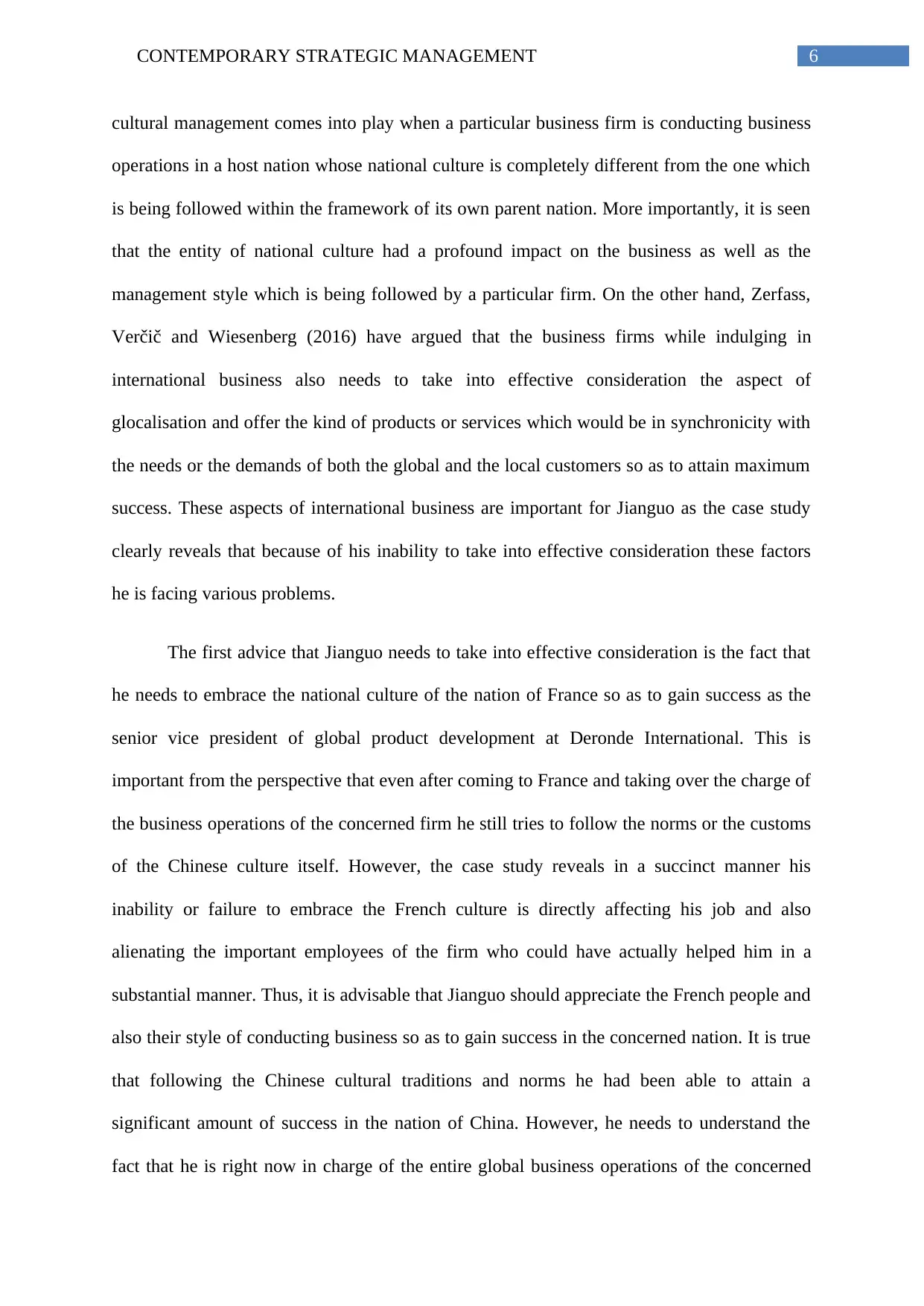
6CONTEMPORARY STRATEGIC MANAGEMENT
cultural management comes into play when a particular business firm is conducting business
operations in a host nation whose national culture is completely different from the one which
is being followed within the framework of its own parent nation. More importantly, it is seen
that the entity of national culture had a profound impact on the business as well as the
management style which is being followed by a particular firm. On the other hand, Zerfass,
Verčič and Wiesenberg (2016) have argued that the business firms while indulging in
international business also needs to take into effective consideration the aspect of
glocalisation and offer the kind of products or services which would be in synchronicity with
the needs or the demands of both the global and the local customers so as to attain maximum
success. These aspects of international business are important for Jianguo as the case study
clearly reveals that because of his inability to take into effective consideration these factors
he is facing various problems.
The first advice that Jianguo needs to take into effective consideration is the fact that
he needs to embrace the national culture of the nation of France so as to gain success as the
senior vice president of global product development at Deronde International. This is
important from the perspective that even after coming to France and taking over the charge of
the business operations of the concerned firm he still tries to follow the norms or the customs
of the Chinese culture itself. However, the case study reveals in a succinct manner his
inability or failure to embrace the French culture is directly affecting his job and also
alienating the important employees of the firm who could have actually helped him in a
substantial manner. Thus, it is advisable that Jianguo should appreciate the French people and
also their style of conducting business so as to gain success in the concerned nation. It is true
that following the Chinese cultural traditions and norms he had been able to attain a
significant amount of success in the nation of China. However, he needs to understand the
fact that he is right now in charge of the entire global business operations of the concerned
cultural management comes into play when a particular business firm is conducting business
operations in a host nation whose national culture is completely different from the one which
is being followed within the framework of its own parent nation. More importantly, it is seen
that the entity of national culture had a profound impact on the business as well as the
management style which is being followed by a particular firm. On the other hand, Zerfass,
Verčič and Wiesenberg (2016) have argued that the business firms while indulging in
international business also needs to take into effective consideration the aspect of
glocalisation and offer the kind of products or services which would be in synchronicity with
the needs or the demands of both the global and the local customers so as to attain maximum
success. These aspects of international business are important for Jianguo as the case study
clearly reveals that because of his inability to take into effective consideration these factors
he is facing various problems.
The first advice that Jianguo needs to take into effective consideration is the fact that
he needs to embrace the national culture of the nation of France so as to gain success as the
senior vice president of global product development at Deronde International. This is
important from the perspective that even after coming to France and taking over the charge of
the business operations of the concerned firm he still tries to follow the norms or the customs
of the Chinese culture itself. However, the case study reveals in a succinct manner his
inability or failure to embrace the French culture is directly affecting his job and also
alienating the important employees of the firm who could have actually helped him in a
substantial manner. Thus, it is advisable that Jianguo should appreciate the French people and
also their style of conducting business so as to gain success in the concerned nation. It is true
that following the Chinese cultural traditions and norms he had been able to attain a
significant amount of success in the nation of China. However, he needs to understand the
fact that he is right now in charge of the entire global business operations of the concerned
Paraphrase This Document
Need a fresh take? Get an instant paraphrase of this document with our AI Paraphraser
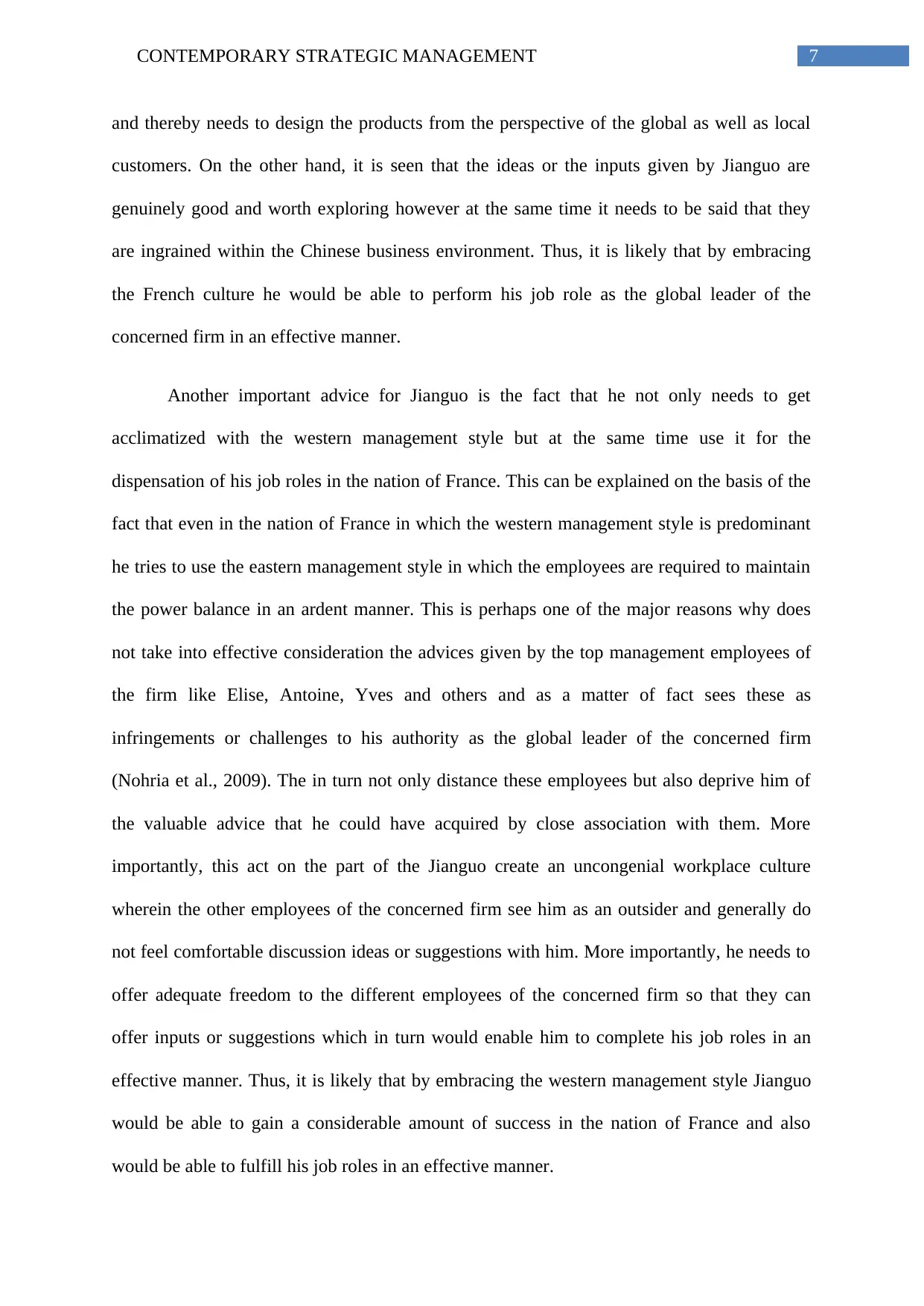
7CONTEMPORARY STRATEGIC MANAGEMENT
and thereby needs to design the products from the perspective of the global as well as local
customers. On the other hand, it is seen that the ideas or the inputs given by Jianguo are
genuinely good and worth exploring however at the same time it needs to be said that they
are ingrained within the Chinese business environment. Thus, it is likely that by embracing
the French culture he would be able to perform his job role as the global leader of the
concerned firm in an effective manner.
Another important advice for Jianguo is the fact that he not only needs to get
acclimatized with the western management style but at the same time use it for the
dispensation of his job roles in the nation of France. This can be explained on the basis of the
fact that even in the nation of France in which the western management style is predominant
he tries to use the eastern management style in which the employees are required to maintain
the power balance in an ardent manner. This is perhaps one of the major reasons why does
not take into effective consideration the advices given by the top management employees of
the firm like Elise, Antoine, Yves and others and as a matter of fact sees these as
infringements or challenges to his authority as the global leader of the concerned firm
(Nohria et al., 2009). The in turn not only distance these employees but also deprive him of
the valuable advice that he could have acquired by close association with them. More
importantly, this act on the part of the Jianguo create an uncongenial workplace culture
wherein the other employees of the concerned firm see him as an outsider and generally do
not feel comfortable discussion ideas or suggestions with him. More importantly, he needs to
offer adequate freedom to the different employees of the concerned firm so that they can
offer inputs or suggestions which in turn would enable him to complete his job roles in an
effective manner. Thus, it is likely that by embracing the western management style Jianguo
would be able to gain a considerable amount of success in the nation of France and also
would be able to fulfill his job roles in an effective manner.
and thereby needs to design the products from the perspective of the global as well as local
customers. On the other hand, it is seen that the ideas or the inputs given by Jianguo are
genuinely good and worth exploring however at the same time it needs to be said that they
are ingrained within the Chinese business environment. Thus, it is likely that by embracing
the French culture he would be able to perform his job role as the global leader of the
concerned firm in an effective manner.
Another important advice for Jianguo is the fact that he not only needs to get
acclimatized with the western management style but at the same time use it for the
dispensation of his job roles in the nation of France. This can be explained on the basis of the
fact that even in the nation of France in which the western management style is predominant
he tries to use the eastern management style in which the employees are required to maintain
the power balance in an ardent manner. This is perhaps one of the major reasons why does
not take into effective consideration the advices given by the top management employees of
the firm like Elise, Antoine, Yves and others and as a matter of fact sees these as
infringements or challenges to his authority as the global leader of the concerned firm
(Nohria et al., 2009). The in turn not only distance these employees but also deprive him of
the valuable advice that he could have acquired by close association with them. More
importantly, this act on the part of the Jianguo create an uncongenial workplace culture
wherein the other employees of the concerned firm see him as an outsider and generally do
not feel comfortable discussion ideas or suggestions with him. More importantly, he needs to
offer adequate freedom to the different employees of the concerned firm so that they can
offer inputs or suggestions which in turn would enable him to complete his job roles in an
effective manner. Thus, it is likely that by embracing the western management style Jianguo
would be able to gain a considerable amount of success in the nation of France and also
would be able to fulfill his job roles in an effective manner.
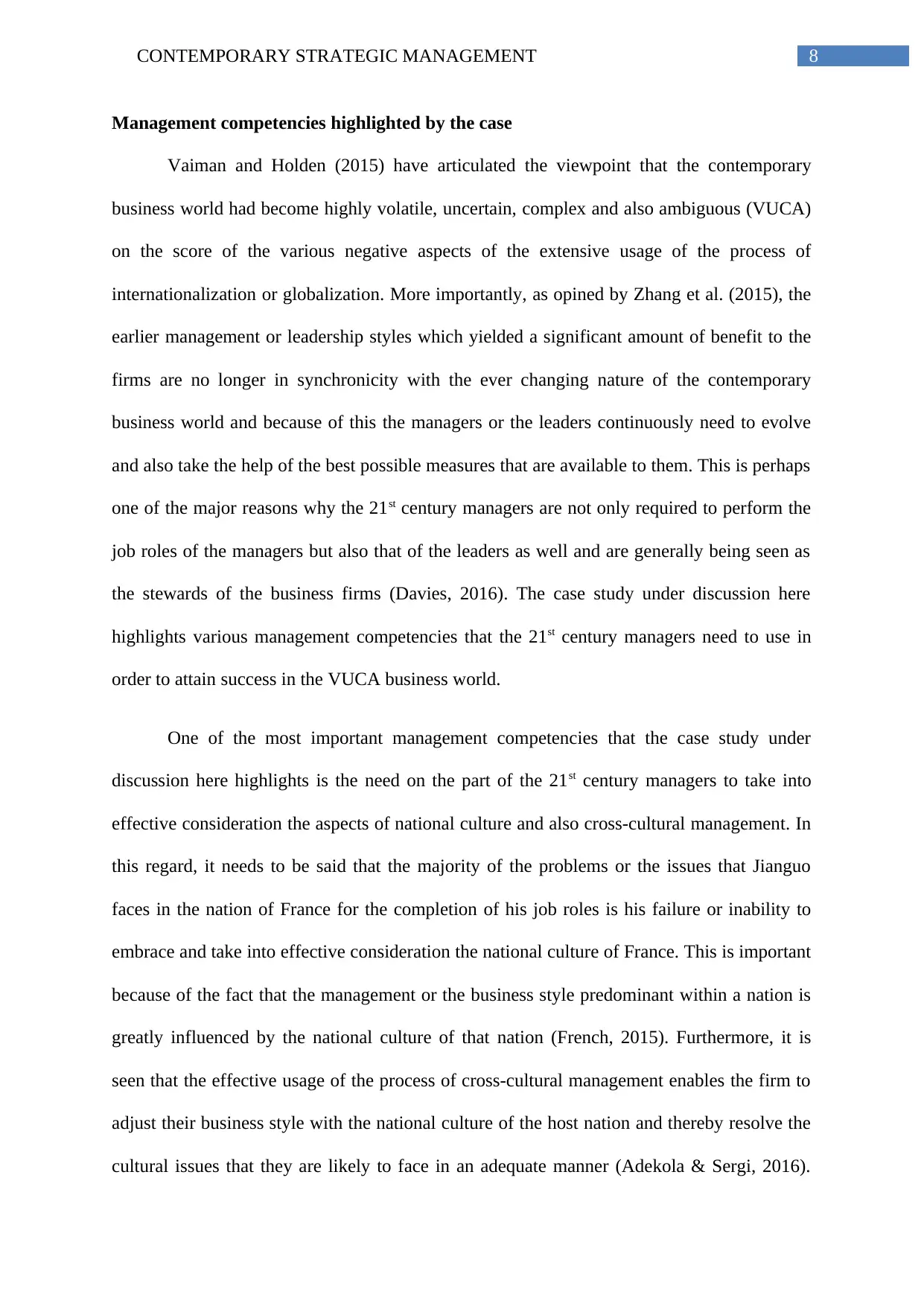
8CONTEMPORARY STRATEGIC MANAGEMENT
Management competencies highlighted by the case
Vaiman and Holden (2015) have articulated the viewpoint that the contemporary
business world had become highly volatile, uncertain, complex and also ambiguous (VUCA)
on the score of the various negative aspects of the extensive usage of the process of
internationalization or globalization. More importantly, as opined by Zhang et al. (2015), the
earlier management or leadership styles which yielded a significant amount of benefit to the
firms are no longer in synchronicity with the ever changing nature of the contemporary
business world and because of this the managers or the leaders continuously need to evolve
and also take the help of the best possible measures that are available to them. This is perhaps
one of the major reasons why the 21st century managers are not only required to perform the
job roles of the managers but also that of the leaders as well and are generally being seen as
the stewards of the business firms (Davies, 2016). The case study under discussion here
highlights various management competencies that the 21st century managers need to use in
order to attain success in the VUCA business world.
One of the most important management competencies that the case study under
discussion here highlights is the need on the part of the 21st century managers to take into
effective consideration the aspects of national culture and also cross-cultural management. In
this regard, it needs to be said that the majority of the problems or the issues that Jianguo
faces in the nation of France for the completion of his job roles is his failure or inability to
embrace and take into effective consideration the national culture of France. This is important
because of the fact that the management or the business style predominant within a nation is
greatly influenced by the national culture of that nation (French, 2015). Furthermore, it is
seen that the effective usage of the process of cross-cultural management enables the firm to
adjust their business style with the national culture of the host nation and thereby resolve the
cultural issues that they are likely to face in an adequate manner (Adekola & Sergi, 2016).
Management competencies highlighted by the case
Vaiman and Holden (2015) have articulated the viewpoint that the contemporary
business world had become highly volatile, uncertain, complex and also ambiguous (VUCA)
on the score of the various negative aspects of the extensive usage of the process of
internationalization or globalization. More importantly, as opined by Zhang et al. (2015), the
earlier management or leadership styles which yielded a significant amount of benefit to the
firms are no longer in synchronicity with the ever changing nature of the contemporary
business world and because of this the managers or the leaders continuously need to evolve
and also take the help of the best possible measures that are available to them. This is perhaps
one of the major reasons why the 21st century managers are not only required to perform the
job roles of the managers but also that of the leaders as well and are generally being seen as
the stewards of the business firms (Davies, 2016). The case study under discussion here
highlights various management competencies that the 21st century managers need to use in
order to attain success in the VUCA business world.
One of the most important management competencies that the case study under
discussion here highlights is the need on the part of the 21st century managers to take into
effective consideration the aspects of national culture and also cross-cultural management. In
this regard, it needs to be said that the majority of the problems or the issues that Jianguo
faces in the nation of France for the completion of his job roles is his failure or inability to
embrace and take into effective consideration the national culture of France. This is important
because of the fact that the management or the business style predominant within a nation is
greatly influenced by the national culture of that nation (French, 2015). Furthermore, it is
seen that the effective usage of the process of cross-cultural management enables the firm to
adjust their business style with the national culture of the host nation and thereby resolve the
cultural issues that they are likely to face in an adequate manner (Adekola & Sergi, 2016).
⊘ This is a preview!⊘
Do you want full access?
Subscribe today to unlock all pages.

Trusted by 1+ million students worldwide
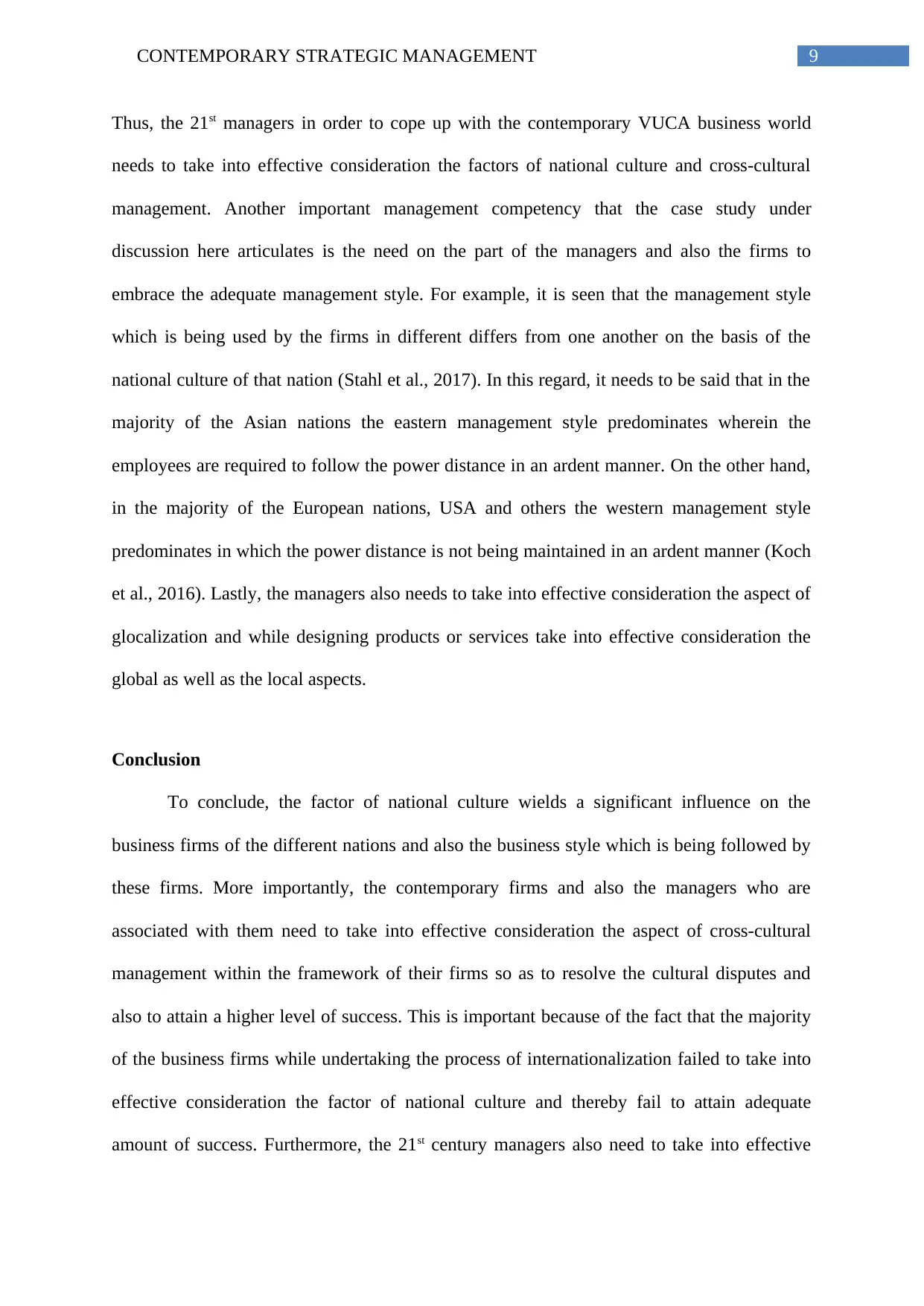
9CONTEMPORARY STRATEGIC MANAGEMENT
Thus, the 21st managers in order to cope up with the contemporary VUCA business world
needs to take into effective consideration the factors of national culture and cross-cultural
management. Another important management competency that the case study under
discussion here articulates is the need on the part of the managers and also the firms to
embrace the adequate management style. For example, it is seen that the management style
which is being used by the firms in different differs from one another on the basis of the
national culture of that nation (Stahl et al., 2017). In this regard, it needs to be said that in the
majority of the Asian nations the eastern management style predominates wherein the
employees are required to follow the power distance in an ardent manner. On the other hand,
in the majority of the European nations, USA and others the western management style
predominates in which the power distance is not being maintained in an ardent manner (Koch
et al., 2016). Lastly, the managers also needs to take into effective consideration the aspect of
glocalization and while designing products or services take into effective consideration the
global as well as the local aspects.
Conclusion
To conclude, the factor of national culture wields a significant influence on the
business firms of the different nations and also the business style which is being followed by
these firms. More importantly, the contemporary firms and also the managers who are
associated with them need to take into effective consideration the aspect of cross-cultural
management within the framework of their firms so as to resolve the cultural disputes and
also to attain a higher level of success. This is important because of the fact that the majority
of the business firms while undertaking the process of internationalization failed to take into
effective consideration the factor of national culture and thereby fail to attain adequate
amount of success. Furthermore, the 21st century managers also need to take into effective
Thus, the 21st managers in order to cope up with the contemporary VUCA business world
needs to take into effective consideration the factors of national culture and cross-cultural
management. Another important management competency that the case study under
discussion here articulates is the need on the part of the managers and also the firms to
embrace the adequate management style. For example, it is seen that the management style
which is being used by the firms in different differs from one another on the basis of the
national culture of that nation (Stahl et al., 2017). In this regard, it needs to be said that in the
majority of the Asian nations the eastern management style predominates wherein the
employees are required to follow the power distance in an ardent manner. On the other hand,
in the majority of the European nations, USA and others the western management style
predominates in which the power distance is not being maintained in an ardent manner (Koch
et al., 2016). Lastly, the managers also needs to take into effective consideration the aspect of
glocalization and while designing products or services take into effective consideration the
global as well as the local aspects.
Conclusion
To conclude, the factor of national culture wields a significant influence on the
business firms of the different nations and also the business style which is being followed by
these firms. More importantly, the contemporary firms and also the managers who are
associated with them need to take into effective consideration the aspect of cross-cultural
management within the framework of their firms so as to resolve the cultural disputes and
also to attain a higher level of success. This is important because of the fact that the majority
of the business firms while undertaking the process of internationalization failed to take into
effective consideration the factor of national culture and thereby fail to attain adequate
amount of success. Furthermore, the 21st century managers also need to take into effective
Paraphrase This Document
Need a fresh take? Get an instant paraphrase of this document with our AI Paraphraser
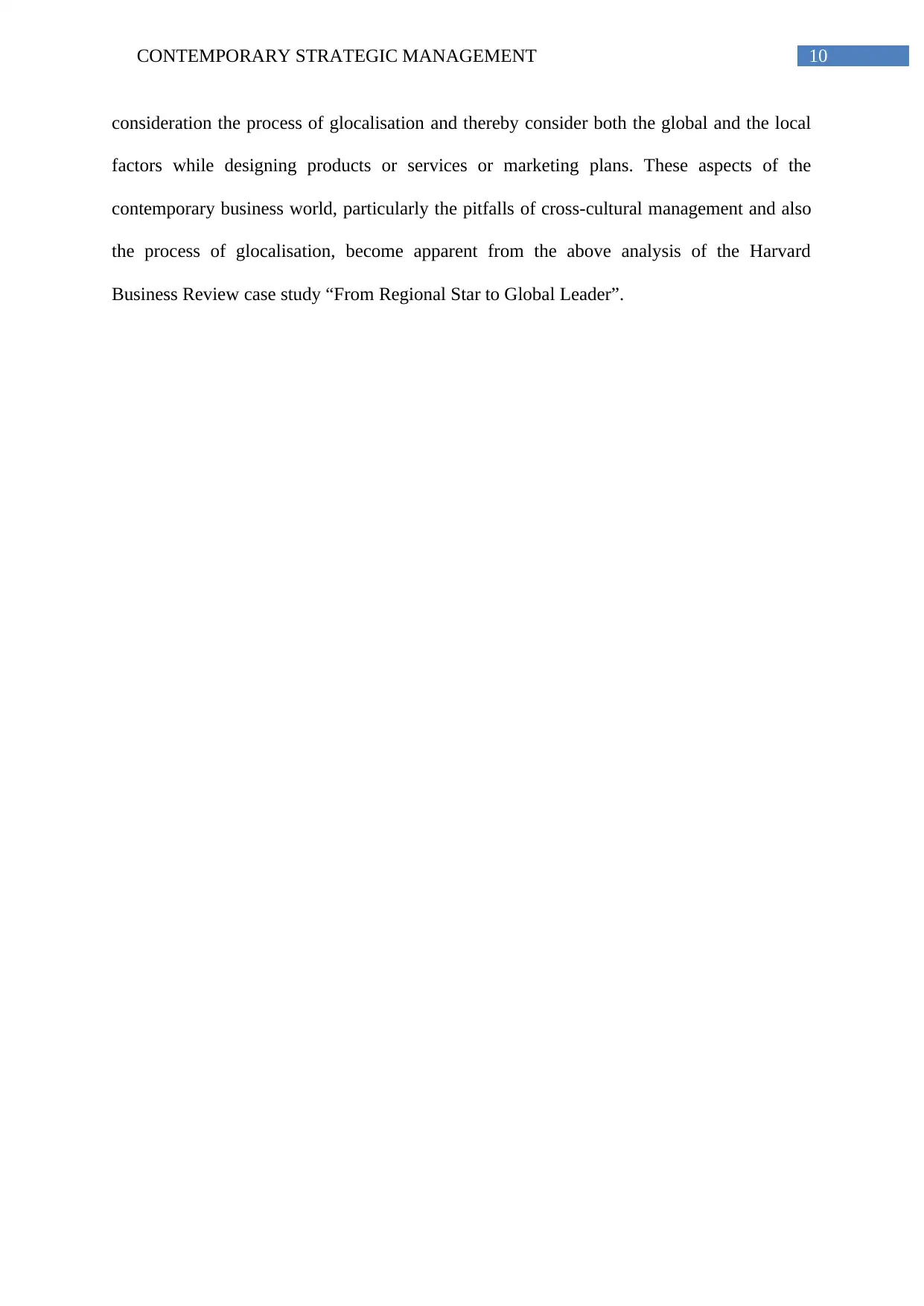
10CONTEMPORARY STRATEGIC MANAGEMENT
consideration the process of glocalisation and thereby consider both the global and the local
factors while designing products or services or marketing plans. These aspects of the
contemporary business world, particularly the pitfalls of cross-cultural management and also
the process of glocalisation, become apparent from the above analysis of the Harvard
Business Review case study “From Regional Star to Global Leader”.
consideration the process of glocalisation and thereby consider both the global and the local
factors while designing products or services or marketing plans. These aspects of the
contemporary business world, particularly the pitfalls of cross-cultural management and also
the process of glocalisation, become apparent from the above analysis of the Harvard
Business Review case study “From Regional Star to Global Leader”.
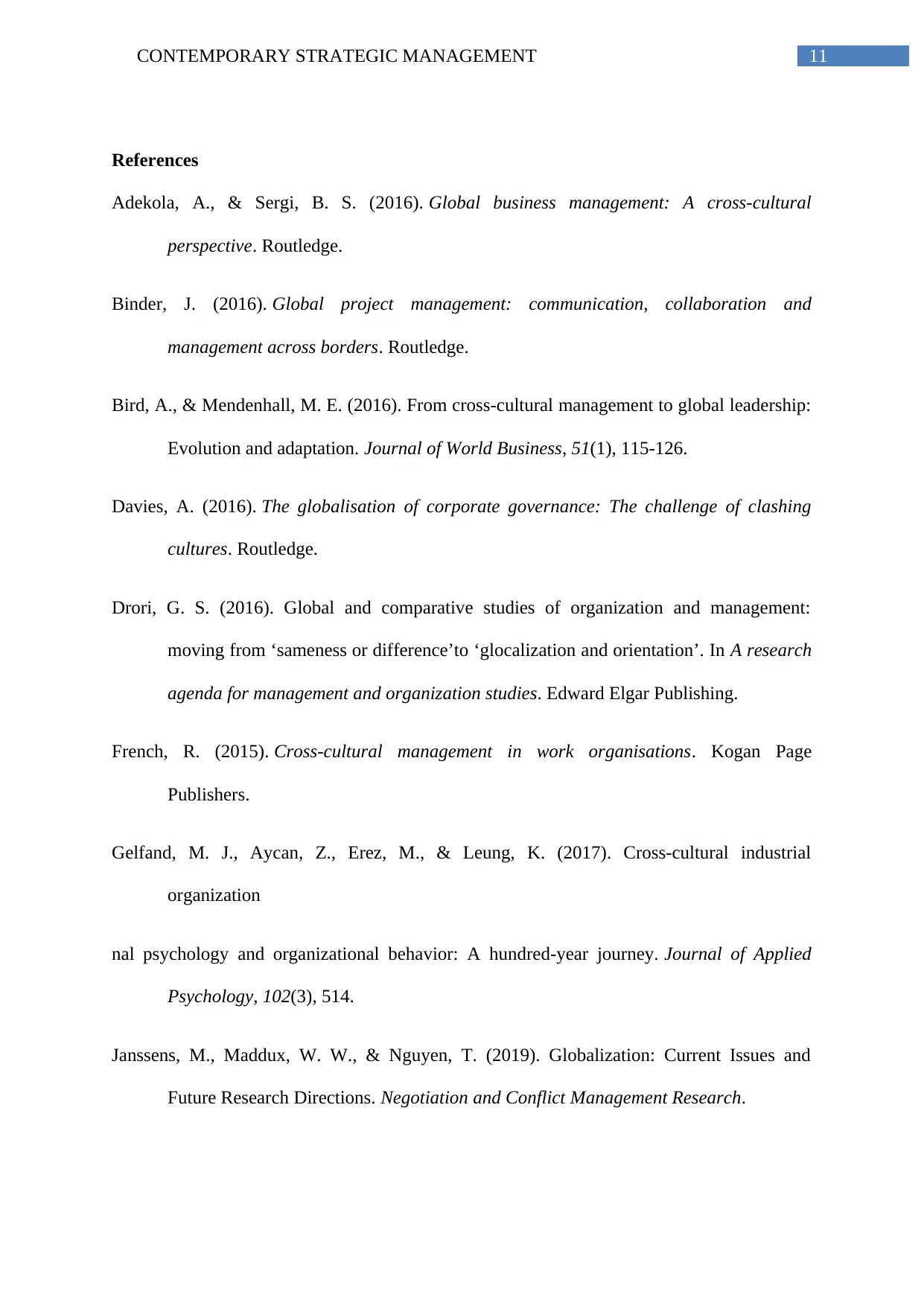
11CONTEMPORARY STRATEGIC MANAGEMENT
References
Adekola, A., & Sergi, B. S. (2016). Global business management: A cross-cultural
perspective. Routledge.
Binder, J. (2016). Global project management: communication, collaboration and
management across borders. Routledge.
Bird, A., & Mendenhall, M. E. (2016). From cross-cultural management to global leadership:
Evolution and adaptation. Journal of World Business, 51(1), 115-126.
Davies, A. (2016). The globalisation of corporate governance: The challenge of clashing
cultures. Routledge.
Drori, G. S. (2016). Global and comparative studies of organization and management:
moving from ‘sameness or difference’to ‘glocalization and orientation’. In A research
agenda for management and organization studies. Edward Elgar Publishing.
French, R. (2015). Cross-cultural management in work organisations. Kogan Page
Publishers.
Gelfand, M. J., Aycan, Z., Erez, M., & Leung, K. (2017). Cross-cultural industrial
organization
nal psychology and organizational behavior: A hundred-year journey. Journal of Applied
Psychology, 102(3), 514.
Janssens, M., Maddux, W. W., & Nguyen, T. (2019). Globalization: Current Issues and
Future Research Directions. Negotiation and Conflict Management Research.
References
Adekola, A., & Sergi, B. S. (2016). Global business management: A cross-cultural
perspective. Routledge.
Binder, J. (2016). Global project management: communication, collaboration and
management across borders. Routledge.
Bird, A., & Mendenhall, M. E. (2016). From cross-cultural management to global leadership:
Evolution and adaptation. Journal of World Business, 51(1), 115-126.
Davies, A. (2016). The globalisation of corporate governance: The challenge of clashing
cultures. Routledge.
Drori, G. S. (2016). Global and comparative studies of organization and management:
moving from ‘sameness or difference’to ‘glocalization and orientation’. In A research
agenda for management and organization studies. Edward Elgar Publishing.
French, R. (2015). Cross-cultural management in work organisations. Kogan Page
Publishers.
Gelfand, M. J., Aycan, Z., Erez, M., & Leung, K. (2017). Cross-cultural industrial
organization
nal psychology and organizational behavior: A hundred-year journey. Journal of Applied
Psychology, 102(3), 514.
Janssens, M., Maddux, W. W., & Nguyen, T. (2019). Globalization: Current Issues and
Future Research Directions. Negotiation and Conflict Management Research.
⊘ This is a preview!⊘
Do you want full access?
Subscribe today to unlock all pages.

Trusted by 1+ million students worldwide
1 out of 14
Related Documents
Your All-in-One AI-Powered Toolkit for Academic Success.
+13062052269
info@desklib.com
Available 24*7 on WhatsApp / Email
![[object Object]](/_next/static/media/star-bottom.7253800d.svg)
Unlock your academic potential
Copyright © 2020–2026 A2Z Services. All Rights Reserved. Developed and managed by ZUCOL.





